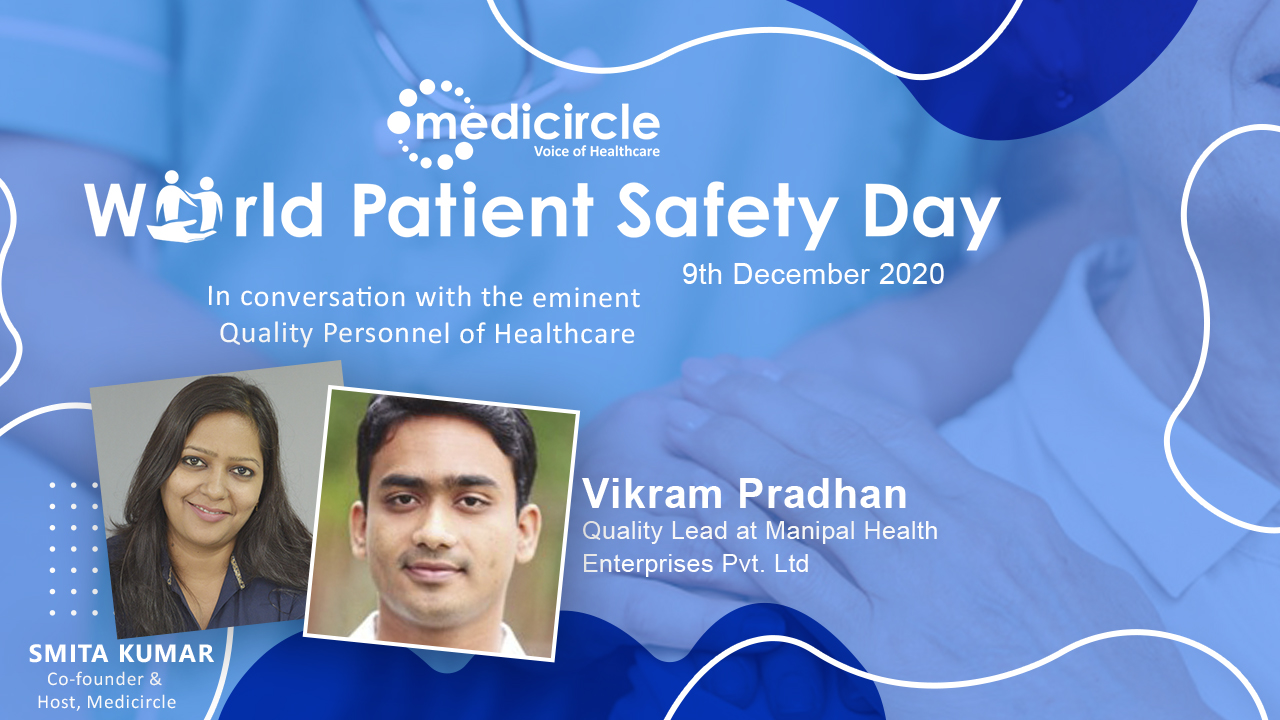Patient safety is the absence of preventable harm to a patient during the process of health care and reduction of risk of unnecessary harm associated with health care to an acceptable minimum.
Vikram Pradhan, Quality Lead, Manipal Health Enterprises Pvt. Ltd is an experienced Hospital Administrator with a demonstrated history of working in the Hospital & Health Care industry.
Manipal Health Enterprises Pvt. Ltd is an integrated hospital service system that provides healthcare from the smallest to the most complex medical problems.
Strict adherence to the principle of “First do no harm”
Vikram explains in brief how patient safety is a global health priority,
- “Patient safety can be ensured only when you have access to : safe infrastructure, technologies and medical devices, and their safe use by patients, who need to be well informed; and a skilled and committed health workforce, in an enabling and safe environment.
- Patient safety builds on quality, basic and continued education and training of health professionals that ensures that they have the adequate professional skills and competencies in their respective roles and functions.
- Recognizing that access to safe, effective, quality and affordable medicines and other commodities, and their correct administration and use, also contribute to patient safety.
- The importance of hygiene for patient safety and the prevention of health care-associated infections, and for reducing antimicrobial resistance.
- Strict adherence to the principle of “First do no harm” and recognizing the benefits to be gained and the need to promote and improve patient safety across health systems at all levels, sectors and settings relevant to physical and mental health, especially at the level of primary , secondary, tertiary (including emergency),” he says.
Sensitization of Health workers
Vikram shares his opinion on the theme for this year’s Patient safety day is Safe health workers, Safe patients and their contribution,
- “Sensitization of Health workers towards all the protocols and updating them time to time was done
- Various mock drill on a frequent basis (like hand hygiene, safe distances etc) were conducted and it is continuous process
- Proper and adequate amount of PPE kits, masks, sanitizer were kept available for all the health care workers
- Weekly safety audits which include clinical and nonclinical parameters, to ensure systems/ processes are in place,” he says.
Working hand-in-hand with technology is the future
Vikram sheds light on the subject, “The future of healthcare lies in working hand-in-hand with the technology and healthcare workers have to embrace emerging healthcare technologies in order to stay relevant in the coming years. Digital technology could help us transform unsustainable healthcare systems into sustainable ones, equalize the relationship between medical professionals and patients, and provide cheaper, faster, and more effective solutions for diseases. Some of the initiatives that we took during the COVID Situation is Telemedicine, Video consultations, e-prescriptions, etc, which has helped many of the patients during this COVID Situation just ensuring no exposure to the infectious environment ( i.e., again patient safety),” he says.
Quality Assurance programs
Vikram points out what they are doing to ensure patient safety from diagnostic errors, healthcare-acquired infections, medication errors, readmissions, wrong-site surgery, and communication,
- “We have defined a set of SOP - Quality Assurance programs for ICU, Laboratory, Radiology, Emergency services
- all the quality indicators as per the NABH 5th edition is been monitored and tracked on a monthly basis, we find the RCA( Root cause analysis) for each deviation and take corrective action and preventive action (Prescription errors, administration errors, transcribing errors, surgical site infection rate, VAP(ventilator-associated pneumonia, re-exploration rate, CAUTI, blood body fluid exposures, rescheduling of surgery)
- Apart from all these we also involve ourselves in active and passive communication to patient and their attendants whoever walking the hospital premises
- We conduct many social programs for the public on patient safety
- We conduct events like "Hand hygiene week", "Patient Safety Day"
We have formed different committees and ensure this meeting is held every quarter to discuss the deviations, new plans, etc( for example Biomedical waste, Hospital infection, pharmacotherapeutic, purchase and condemnation, safety, quality improvement ),” he says.
Edited By- Rabia Mistry Mulla

 “Patient safety can be ensured only when you have access to: safe infrastructure, technologies and medical devices, and their safe use by patients,†says Vikram Pradhan, Quality Lead, Manipal Health Enterprises Pvt. Ltd.
“Patient safety can be ensured only when you have access to: safe infrastructure, technologies and medical devices, and their safe use by patients,†says Vikram Pradhan, Quality Lead, Manipal Health Enterprises Pvt. Ltd.










.jpeg)




.jpeg)

.jpg)













